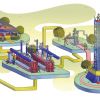-
 +25 +1
+25 +1Potty Trained Cows Are No Joke for the Climate
Researchers are teaching cows to pee in designated places where the urine can be collected, sharply reducing methane emissions.
-
 +22 +1
+22 +1Parisians vote in favour of tripling parking costs for SUVs
The referendum comes as the city aims to reduce emissions by targeting wealthy drivers in large, polluting cars
-
 +3 +1
+3 +1Natural gas can rival coal's climate-warming potential when leaks are counted
Climate-warming greenhouse gasses from natural gas could be as damaging as those from coal, according to a new analysis.
-
 +24 +1
+24 +1Climate change warnings started in the late 1800s. Here's what humanity knew and when.
Political misinformation continues to swirl around the climate change discussion like a thick fog rolling in off the rising ocean. But a host of government documents and reports by researchers and historians lay a clear trail of what scientists and government officials knew and when.
-
 +4 +1
+4 +1Salting and burying biomass crops in dry landfills could economically capture greenhouse gases for thousands of years
Reducing global greenhouse gas emissions is critical to avoiding a climate disaster, but current carbon removal methods are proving to be inadequate and costly. Now researchers from the University of California, Berkeley, have proposed a scalable solution that uses simple, inexpensive technologies to remove carbon from our atmosphere and safely store it for thousands of years.
-
 +27 +1
+27 +1Dubai launches first self-driving electric abra
Dubai's first autonomous electric wooden abra has hit the waters to support efforts to cut carbon emissions and boost the emirate's self-driving transport goals. The revamped vessel has embarked on its first journey from Al Jadaf Station to the Festival City Station on Dubai Creek as part of a trial run.
-
 +21 +1
+21 +1Broward public schools going "green" with new electric buses
Broward County Public Schools is going green with its yellow school buses. It will be the first school district in South Florida to put electric buses on the road. On Thursday, they showed off the new buses at a transportation terminal in Pompano Beach. The district said the new buses will help lower carbon emissions as it transports 54,000 students throughout the county every school day.
-
 +24 +1
+24 +1Earth Month is ending, but these sustainability tips are evergreen
In celebration of Earth Day, Life Kit asked our audience to share their sustainability hacks – what small (or big) acts do you take in your life to center the longevity of our planet? Your responses ranged from creatively repurposing plastic bags to giving up driving altogether! While Earth Month is ending, we're sharing some of the most useful and actionable tips we received. We hope they inspire you for the rest of the year — no need to wait until Earth Day next year to adopt one of these ideas.
-
 +20 +1
+20 +1The climate crisis and biodiversity crisis can't be approached separately, says study
Human beings have massively changed the Earth system. Greenhouse-gas emissions produced by human activities have caused the global mean temperature to rise by more than 1.1°C compared to the preindustrial era. And every year, there are additional emissions of carbon dioxide, methane and other greenhouse gases, currently amounting to more than 55 gigatons of carbon dioxide equivalent.
-
 +22 +1
+22 +1Up in smoke: Human activities are fuelling wildfires that burn essential carbon-sequestering peatlands
For centuries, society has scorned bogs, fens and swamps — collectively known as peatlands — treating them as wastelands available to be drained and developed without realizing they’re important buffers against climate-changing carbon emissions.
-
 +15 +1
+15 +1A Hidden Underwater Resource Is Worth Way More Than Expected, Study Reveals
Researchers have just calculated the value society gets from a common but hidden underwater resource, and found it's way higher than we ever expected.
-
 +2 +1
+2 +1Airlines want you to buy carbon offsets. Experts say they’re a ‘scam.’
“Book more sustainably” — that was the message German airline Lufthansa marketed to travelers when it launched its new “Green Fares” in February. Lufthansa’s new program gives passengers the option to spend a little more money to purportedly reduce the climate impacts of their flights. But climate advocates were quick to criticize the program as another case of greenwashing in aviation.
-
 +17 +1
+17 +1'Big sponge': new CO2 tech taps oceans to tackle global warming
Floating in the port of Los Angeles, a strange-looking barge covered with pipes and tanks contains a concept that scientists hope to make waves: a new way to use the ocean as a vast carbon dioxide sponge to tackle global warming. Scientists from University of California Los Angeles (UCLA) have been working for two years on SeaChange—an ambitious project that could one day boost the amount of CO2, a major greenhouse gas, that can be absorbed by our seas.
-
 +4 +1
+4 +1Wealthy Countries Have Blown Through Their Carbon Budgets
More than a century of burning fossil fuels has unleashed fiercer heat waves and droughts, heavier downpours that cause massive floods and other extreme climate disruptions. If we want to avoid even worse effects of climate change in the future, humans need to keep the rise in global temperatures as far below two degrees Celsius as possible.
-
 +21 +1
+21 +1World’s scientists say 1.5C still achievable but ‘humanity on thin ice’
After five years of meetings, reports and debate, the world’s scientific community has delivered an ultimatum on the climate crisis: “Act now to secure a liveable sustainable future for all.” The so-called “synthesis report” was published on Monday by the United Nations’ Intergovernmental Panel on Climate Change (IPCC), a body made up of hundreds of international scientists from a dizzying array of disciplines.
-
 +17 +1
+17 +1World is on brink of climate calamity, definitive U.N. climate report warns
Scientists warn that the world is on the brink of dangerous, irreversible warming in a definitive U.N. climate report and called for more aggressive actions to avert catastrophe.
-
 +17 +1
+17 +1What’s the Real Cost of Mezcal?
Communities in Oaxaca, Mexico, are striving to produce mezcal sustainably—but soaring demand from across the border makes it tough.
-
 +14 +1
+14 +1United Airlines wants to turn algae into jet fuel
United Airlines has made a multimillion-dollar investment into a technology company that is hoping to turn algae into jet fuel. United announced the $5 million investment in the biofuel company Viridos on Monday. Viridos specializes in bioengineering microalgae into algae oil, which could one day be scaled to produce sustainable aviation fuel, aka SAF.
-
 +4 +1
+4 +117 Most Incredible Sustainable Houses that Sync with Nature
Good architecture celebrates design with nature. While homes are your go-to places to feel secure, sustainable homes make a promise of safety to the natural environment. These are innovations in designs offering spectacular results ensuring energy efficiency and minimized running costs.
-
 +26 +1
+26 +1This Startup Is Making Ultra-Strong Building Panels Out of Grass
Construction is a major carbon emitter. The manufacture of cement alone accounts for eight percent of the world’s emissions. But humanity certainly isn’t about to stop building things—in fact, fixing the housing shortage should be near the top of our list of problems to solve. So we need to find more sustainable ways to build, and if they can be cheaper to boot, even better.
Submit a link
Start a discussion




















